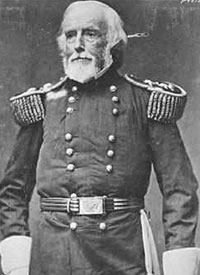Joseph King Fenno Mansfield (1803-1862)
Joseph King Fenno Mansfield (December 22, 1803 - September 18, 1862) was a career U.S. Army officer, civil engineer, and a Union general in the American Civil War, mortally wounded at the Battle of Antietam.
 Mansfield was born in New Haven, Connecticut. He attended the U.S. Military Academy and graduated second in a class of forty in 1822. He was commissioned a second lieutenant in the U.S. Army Corps of Engineers. Advancement came slowly in the peacetime Army and he was promoted to first lieutenant in 1832, captain in 1838.
Mansfield was born in New Haven, Connecticut. He attended the U.S. Military Academy and graduated second in a class of forty in 1822. He was commissioned a second lieutenant in the U.S. Army Corps of Engineers. Advancement came slowly in the peacetime Army and he was promoted to first lieutenant in 1832, captain in 1838.
In the Mexican-American war, he received a brevet promotion to major for the action at Fort Brown, Texas, on May 9, 1846. He was wounded in the leg at the Battle of Monterrey, and he received a brevet promotion to lieutenant colonel for his actions there. He was brevetted to colonel for the Battle of Buena Vista in 1847.
After the war he was promoted to colonel and Inspector General of the U.S. Army on May 28, 1853.
At the start of the Civil War, Mansfield commanded the Department of Washington, promoted to brigadier general on May 14, 1861. He was stationed at Hatteras Inlet, North Carolina, in October, following the battle fought there by Benjamin Butler in August.
He was a brigade commander in the Department of Virginia from March to June of 1862. His only combat activity during this period was the firing of coastal batteries from Hampton Roads against the ironclad CSS Virginia in its naval battle against the USS Monitor on March 9, 1862. Until fall, Mansfield commanded the Suffolk Division of the VII Corps of the Department of Virginia in the vicinity of Suffolk.
During the Maryland Campaign, when Confederate General Robert E. Lee invaded the North for the first time, Mansfield was given command of the XII Corps of the Army of the Potomac, as of September 15, 1862, two days prior to the Battle of Antietam. He arrived in the camp with 40 years of army experience, but no recent combat. He was white-haired and white-bearded, but had a vigorous manner that belied his age. His officers considered him nervous and fussy, but his men, many of whom were new recruits, liked him well enough due to his shows of blustery enthusiasm and fatherly assurance.
On the morning of September 17, 1862, the I Corps under Maj. Gen. Joseph Hooker attacked from the north, parallel to the Hagerstown Turnpike, smashing into the Confederate left flank. Mansfield's corps came immediately behind. As the lead brigade moved through an open field east of the Miller farmstead, they were subjected to fire by Confederate gunners, who took a terrible toll on the rookie soldiers. The troops were advancing in column formation, more suitable for marching, and their officers ordered deployment into open battle lines, which would reduce the risk of casualties from artillery shelling. Mansfield countermanded these orders, insisting they stay in column, because he was concerned that outside of the immediate control of their officers, the men would break and run. The result of this was to improve the mass of men that descended on the Confederate lines.
Mansfield personally led troops on his left flank, from the brigade of Samuel W. Crawford, in the East Woods. He returned to the rear to bring up more troops, and when he reached the line again he saw soldiers from the 10th Maine Infantry regiment firing into the woods. Mansfield, assuming that men from Hooker's corps were in the woods, rode down the regimental line crying out, "You are firing on our own men!" The soldiers convinced Mansfield that in fact they were not and were receiving heavy fire from the woods. Mansfield replied, "Yes, yes, you are right," and just then his horse was hit and a bullet caught them squarely in the stomach. He was able to dismount and lead his horse to the rear before he collapsed. He was taken to a field hospital at the George Line farm, where he died the next morning.
He is buried in Indian Hill Cemetery, Middletown, Connecticut, and received a posthumous promotion to major general, backdated from July 18, 1862, for his gallantry at Antietam.
 Mansfield was born in New Haven, Connecticut. He attended the U.S. Military Academy and graduated second in a class of forty in 1822. He was commissioned a second lieutenant in the U.S. Army Corps of Engineers. Advancement came slowly in the peacetime Army and he was promoted to first lieutenant in 1832, captain in 1838.
Mansfield was born in New Haven, Connecticut. He attended the U.S. Military Academy and graduated second in a class of forty in 1822. He was commissioned a second lieutenant in the U.S. Army Corps of Engineers. Advancement came slowly in the peacetime Army and he was promoted to first lieutenant in 1832, captain in 1838.